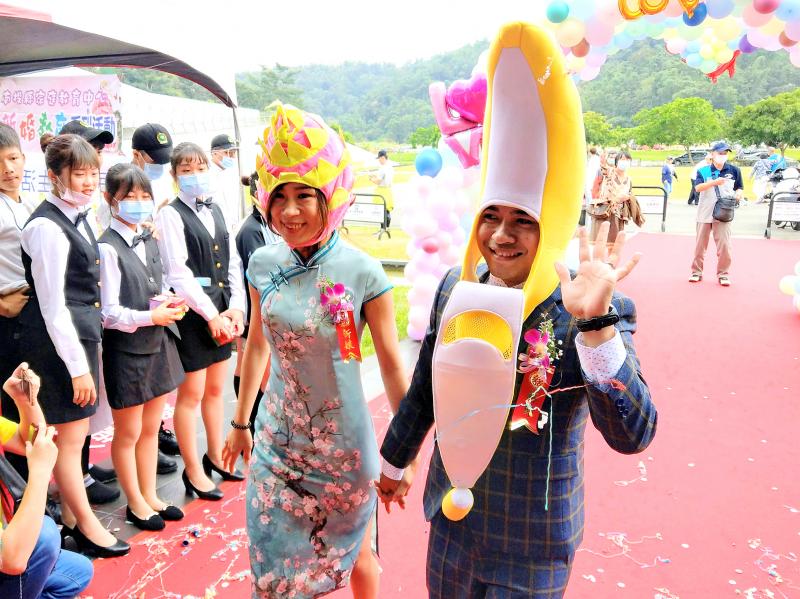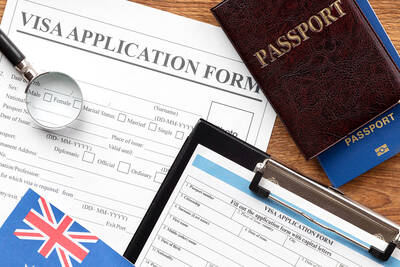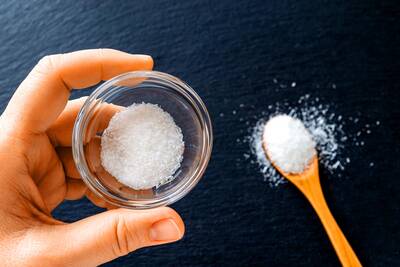Bananas are one of the most commonly seen and eaten fruits. Eating bananas brings many benefits, such as replenishing energy and lowering blood pressure, and can even improve your mood. There is a rumor going around online that you should not eat bananas every day because they are a high-potassium food that can damage your kidneys if you eat too many, but the Health Promotion Administration (HPA) says only people with impaired kidney function have a metabolic deficiency that compels them to avoid eating bananas every day.
Bananas are classified as a medium-potassium food, containing about 325 milligrams of potassium per 100 grams of banana flesh, or about 200 to 399 milligrams of potassium per serving (half a large banana or a whole small one). Research shows that bananas can regulate bowel movements, relieve depression, reduce oxidation, lower blood pressure, promote cardiovascular health and prevent stroke, among other things.
According to the HPA, for people with normal kidney function, consuming plenty of potassium ions from bananas or other food can regulate blood pressure and indirectly protect the kidneys. Only for people with impaired kidney function — those who have been diagnosed with kidney failure — can it be harmful to their health, as they cannot excrete potassium ions.

Photo: Liu Pin-chuan, Liberty Times 照片:自由時報劉濱銓
The best ways to prevent chronic kidney disease are lifestyle improvements, good control of blood pressure, blood sugar and blood fat, lowering urine protein and avoiding drugs that are toxic to the kidneys, as well as early screening and referral to a nephrologist when necessary.
As for how to tell whether your kidneys are functioning normally, you can visit a hospital and find a doctor to perform a kidney function test, or else you can take advantage of the free adult health examinations that the HPA offers once every three years for people aged between 40 and 64 years old and once a year for those aged 65 or older. You can safeguard your kidney health by watching out for any change in your kidney function and following your doctors’ orders for treatment.
(Translated by Julian Clegg, Taipei Times)

照片:旗山區農會提供 Photo courtesy of the Cishan Farmers’ Association
香蕉是平日最常見、又最常吃的水果之一。吃香蕉有很多好處,像是補充體力、降血壓、甚至能讓心情變好,而網傳香蕉是高鉀食物,吃多了會傷腎,不能天天吃;國民健康署表示,只有腎臟功能不全的人,因代謝功能不足,才不能天天吃。
香蕉屬於中量鉀食物,每一百公克香蕉果肉,約含鉀三百二十五毫克,每份(大的半根,小的一根)約含鉀量兩百到三百九十九毫克。實證研究指出,香蕉能夠潤腸通便、解鬱、抗氧化、降血壓、促進心血管健康及防止中風等。
國健署表示,一般腎臟功能正常者,多攝取來自香蕉或其他食物中的鉀離子,不但能控制血壓,也能間接保護腎臟;但對於腎臟功能不全(被診斷為腎衰竭者),因無法將體內鉀離子排除,才會對人體造成傷害。
最佳預防慢性腎臟病的方法有:生活型態的改善、良好的血壓、血糖及血脂肪控制、降低尿蛋白、避免腎毒性藥物,以及早期檢查,必要時轉介腎臟科醫師。
至於要如何知道自己腎臟功能是否正常,民眾可以到醫院找醫師做腎功能檢查,或是利用國健署四十歲至六十四歲每三年一次、六十五歲以上每年一次的免費成人健康檢查,注意自己的腎功能變化,配合醫囑治療,才能保障腎臟健康。
(自由時報)

Even as he grows older, Microsoft founder Bill Gates still fondly remembers the catalytic computer code he wrote 50 years ago that opened up a new frontier in technology. Although the code that Gates printed out on a teletype machine may look crude compared to what’s powering today’s artificial intelligence platforms, it played a critical role in creating Microsoft in April 1975 — a golden anniversary that the Redmond, Washington, company celebrated on April 4. Gates, 69, set the stage for that jubilee with a blog post reminiscing on how he and his old high school friend — the late Paul Allen

Australia’s strict immigration policies have long been criticized, particularly for how they treat people with disabilities. Having been residents of Australia for years, Scottish Laura Currie and her Italian partner, Dante Vendittelli, recently experienced the impact of these immigration policies. Their son Luca, born in Australia and diagnosed with cystic fibrosis, became the reason their residency application was denied due to the anticipated high healthcare costs. Had Luca been healthy, there would have been no objections to their permanent residency. This case not only highlights discrimination against disabled individuals, but also raises questions about fairness and inclusion within Australia’s immigration

The study had several issues. Small sample sizes made it hard to draw __7__ conclusions. Additionally, taking a __8__ like pure MSG on an empty stomach is likely to make a person ill in any case. Choosing individuals who already had a history of the symptoms could have created a bias because they were likely to __9__ the reactions again. When real scientific research on the effects of MSG was eventually done, many of the myths surrounding it were proven __10__. The U.S. Food and Drug Administration and other global organizations have found MSG safe to eat. Today, MSG

1. 為了在最短期間精通日文,他非常用功。 ˇ He is working very hard (in order) to master Japanese in the shortest possible time. χ He is working very hard for mastering Japanese in the shortest possible time. 註: 用 for + 動名詞表示目的,是不合習慣的,應改用不定詞。請看下列句子: 農夫們拿起了武器來保衛他們的村莊。 The farmers took up arms to defend their village. 為了改進工作,我們修改了部分計劃。 We made some changes in our plan (in order) to improve our work. for 作「為了」解,後面跟名詞則是通順的。例如: 我們為這個計畫拚命。 We are working hard for this project. 我們正在為下一代創造更幸福的生活。 We are building a happier life for our children. 2. 他很怕冷。 ˇ The cold bothers him. ˇ Cold weather bothers him. χ He is afraid of the cold. 註: 我們在英漢詞典或中學課本中所看到的英文字詞的中文解釋,和它的英文原義往往只有局部相等。中文的「怕」只有在表達恐懼時,才能用fear 或be afraid of,不能隨便套用,請參考下面二例: 這錶不怕水。 The watch is waterproof. 我不怕熱。 The heat doesn’t